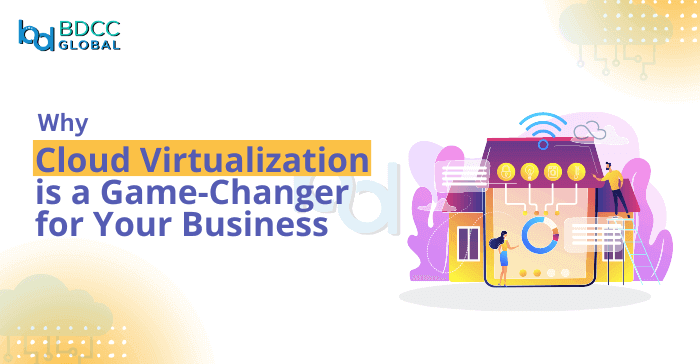
Do you want to avoid dealing with physical hardware limitations and outdated software in your business? Have you ever considered adopting cloud computing to maximize your business potential? If not, it’s time to look at its advantages.
In today’s digital landscape, businesses have revolutionized their operations through cloud virtualization, which offers numerous benefits to streamline operations, reduce costs, and improve overall efficiency.
Let’s dive in and discover how you can leverage the power of virtualization in the cloud to unlock your business’s full potential.
Why use a Cloud-based virtual environment?
The dearth of affordability with hardware is a universally acknowledged fact. Despite this, many businesses recklessly waste their valuable processing power. The “one server, one purpose” mentality that often takes root within IT departments of software development companies significantly contributes to this issue, leading to the thoughtless and wasteful consumption of server capacity.
Efficient implementation of cloud computing services is a remedy for this depravity. It has the potential to significantly reduce hardware demands by maximizing the available machine capacity. This, in turn, eradicates the exorbitant costs associated with purchasing and maintaining underused servers, leading to substantial savings for the organization.
Apart from this, cloud virtualization solutions have several other advantages for businesses of all sizes, some of which we will discuss next.
Advantages of Cloud Computing
Improved Scalability and Flexibility
Cloud virtualization enables businesses to expand their IT resources according to their needs. Companies must invest in hardware and software in traditional IT infrastructures to handle their peak workload. This often results in over-provisioning, which is costly and wasteful.
Cloud computing platforms eliminate the need for over-provisioning by allowing businesses to scale up or down their IT resources in real-time. It helps organizations to adapt quickly to changes in demand and reduce their IT costs.
Increased Efficiency
Cloud-based applications enable businesses to run their applications and processes more efficiently. Businesses can reduce their hardware footprint and energy consumption by consolidating multiple apps onto a single server. As a result, businesses reduce costs and decrease their carbon footprint.
Moreover, Cloud-based computing resources allow businesses to automate many IT processes, such as backups, updates, and security scans.
Enhanced Security
Security is one of the top concerns of businesses regarding cloud computing. Enhanced security features offered by Cloud-based hosting assist organizations in preventing unauthorized access to their data and applications.
With the right concept of virtualization, businesses can implement multi-factor authentication, data encryption, and access control policies to protect their data. Additionally, cloud service providers offer regular security updates and patches to keep their systems secure.
Improved Disaster Recovery
Disaster recovery is another critical concern for businesses. With Cloud-based computing resources, companies can implement robust disaster recovery plans to help them quickly recover from an outage or disaster.
Cloud service providers offer backup and recovery solutions that can automatically replicate data and apps to multiple servers in different locations.
Cost Savings
Saving money is one of the most important benefits of virtual cloud servers. Traditional IT infrastructures require businesses to spend on pricey gear and software that they must change every few years. This results in significant capital expenditures and ongoing maintenance costs.
AWS Consulting Companies offer flexible pricing models that allow businesses to pay for their IT resources on a usage basis. This results in lower costs and more predictable expenses.
Collaboration and Accessibility
Cloud-enabled virtualization provides businesses with collaboration and accessibility features that can help improve their productivity. Employees can access files, programs, and data via cloud-based solutions anytime, from any location.
Additionally, teams can collaborate on real-time projects from anywhere using cloud-based technologies. This can facilitate better communication and speed up task completion.
Conclusion
In today’s rapidly evolving business landscape, cloud computing has become a game-changer, providing companies with the tools they need to stay ahead of the competition. By maximizing efficiency, streamlining operations, and unlocking new opportunities for growth and profitability, cloud virtualization can transform your business and take it to the next level. With so many AWS Consulting Firms available, selecting the best option with years of experience and a proven track record in Cloud-hosted virtual machines is also essential.
FAQs
Q: What is cloud virtualization, and how can it benefit my business?
Cloud-based virtualization is a technology that allows businesses to create virtual versions of their computing infrastructure, including servers, storage, and networks. This technology can offer many benefits, such as increased flexibility, scalability, and cost savings, which can help businesses to maximize their potential.
Q: What are a few of the most important benefits of utilizing cloud computing?
Some critical advantages of cloud-based computing include improved resource utilization, easier IT infrastructure management, and maintenance, increased agility and responsiveness to changing business needs, and enhanced security and data protection.
Q: How can I determine if cloud-enabled virtualization suits my business?
Your company size, IT infrastructure, and budget will determine whether cloud-based virtualization is appropriate for your company. A consultation with a qualified IT professional can help you to assess your options and decide whether it is the right choice for your business.
Q: What difficulties do Cloud-based computing resource users face?
Like any technology, Cloud-based computing resources have potential challenges and risks. These can include data security and privacy issues, potential vendor lock-in, and the need for specialized IT skills and expertise. However, proper planning and implementation can mitigate or manage these risks effectively.
Q: How can I get started with Cloud-based hosting for my business?
Getting started with Cloud-enabled virtualization typically involves three key steps. First, you need to select a cloud provider or platform. After that, you’ll migrate your IT infrastructure to the cloud. And then configure your virtualized environment to meet your specific needs and requirements.
BDCC
Latest posts by BDCC (see all)
- Cloud computing in healthcare: Uses and benefits - June 23, 2025
- What are the Best Practices for Terraform File Structure? - June 10, 2025
- From Monolith to Microservices: DevOps Strategies For a Smooth Transition - June 5, 2025

